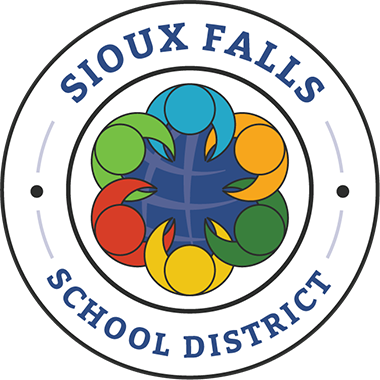Mathematics
Geometry
This course will follow the South Dakota state standards by using geometric terminology in written and oral communications; demonstrate reasoning skills using logic and proofs: demonstrating understanding of parallel and perpendicular lines and angles; demonstrate problem-solving strategies to find measurements of polygons and circles; demonstrate an understanding of geometric constructions; discover relationships of geometric shapes and data generated by technology; solve formulas to find the areas and volumes of plane and solid figures; use trigonometric relationships to find lengths and angles of right triangles; explore properties of transformations; apply statistical reasoning to problem-solving.
Accelerated Geometry
This course will follow the South Dakota state standards by using geometric terminology in written and oral communications; demonstrating deep reasoning skills in presenting logic and proofs; demonstrating understanding of parallel and perpendicular lines and angles; demonstrate multiple problem-solving strategies to find measurements of polygons & circles; demonstrate an understanding of geometric constructions; discover the relationship of geometric shapes and data generated by technology; solve formulas to find the areas and volumes of two-and three-dimensional figures; use trigonometric relationships to find lengths and angles of right triangles; deepen previous knowledge on the properties of transformations; apply statistical reasoning to problem-solving.
Algebra 2
This course will follow the South Dakota state standards. Students will solve quadratic equations; solve systems of equations graphically and algebraically, evaluate expressions with radicals and exponents; find complex solutions; solve exponential, rational, polynomial, and radical equations; study polynomial, exponential, rational functions, and statistical relationships; unit circle trigonometry; trigonometric ratios; analyze sine and cosine graphs.
Accelerated Algebra 2
This course will follow the South Dakota state standards for mathematics. Students will solve quadratic equations; solve systems of equations graphically and algebraically; evaluate expressions with radicals and exponents; find complex solutions; solve exponential, rational, polynomial, and radical equations; study polynomial, exponential, logarithmic, simplify rational expressions, rational functions, and statistical relationships; unit circle trigonometry; trigonometric ratios; analyze sine and cosine graphs.
Accelerated Precalculus
Students in this course will demonstrate algebraic skills; solve equations and inequalities algebraically and graphically; analyze polynomial, rational, exponential, and logarithmic functions; analyze sequences and series; analyze trigonometric and inverse trigonometric functions; apply trigonometric identities; apply the law of sines, law of cosines, parametric and vector concepts to real-world situations; perform operations with polar equations and complex numbers in trigonometric form; determine limits; find derivatives; write equations of tangent lines. This course is designed to prepare students for Calculus (either in high school or college).
College Prep Math
College Prep Algebra is intended to build a foundation for students progressing to College Algebra. Topics studied in the course will include: solving linear equations, graphs of linear functions, linear systems of equations, solving and graphing inequalities, polynomial functions & expressions, rational functions & expressions, radical functions & expressions, quadratic functions & expressions, exponential & logarithmic functions, and conic sections.
College Algebra
This course is a study of the theory and application of functions including function notation, graphs, inverses, polynomial, rational, exponential, logarithmic, and other functions. May also include additional topics such as sequences, series, the binomial theorem, linear system, matrices, or complex numbers.
AP Calculus
AP Calculus is the study of limits, derivatives, and integrals used in modeling physical, biological and economic situations. Functions, concepts, results, and problems are expressed analytically, numerically, graphically, and verbally. Students must have knowledge of the properties, the algebra, and the graphs of linear, polynomial, rational, exponential, logarithmic, trigonometric, inverse trigonometric and piecewise-defined functions. Students will be prepared for the Calculus AB examination.
Syllabus Approved by College Board
AP Statistics
Explore and analyze data using graphical and numerical techniques; plan and implement data collection; use probability to analyze distributions of data; determine appropriate models of statistical inference; make decisions based on confidence intervals and tests of significance.
Syllabus Approved by College Board
Consumer Math 1
This course provides the opportunity for students to apply mathematical skills to a variety of consumer and business situations. It encourages students to become better consumers and to apply key concepts from Algebra in practical consumer situations. Consumer Math I will cover topics in the areas of the stock market, business finances, consumer credit cards, and banking services.
Consumer Math 2
This course provides the opportunity for students to apply mathematical skills to a variety of consumer and business situations. It encourages students to become better consumers and to apply key concepts from Algebra in practical consumer situations. Consumer Math II will cover topics in the areas of automobile ownership, employment, income taxes, independent living, retirement, and budgets.
Applied Math
Applied Math is a year-long course that uses number sense and measurement skills to problem solve applicable situations in various career and job trades. Each unit of study will include an emphasis on the math skills needed to complete real-world case studies. Case studies may include but are not limited to: leasing vs financing a vehicle, investigating the rate of metabolism, ordering materials for building, and renovations. This course provides students the practical mathematics skills needed in a wide variety of trade, technical, and other occupational areas, including plumbing, culinary arts, automotive, electrical and construction trades, machine technology, landscaping, HVAC, health careers, and many more.
